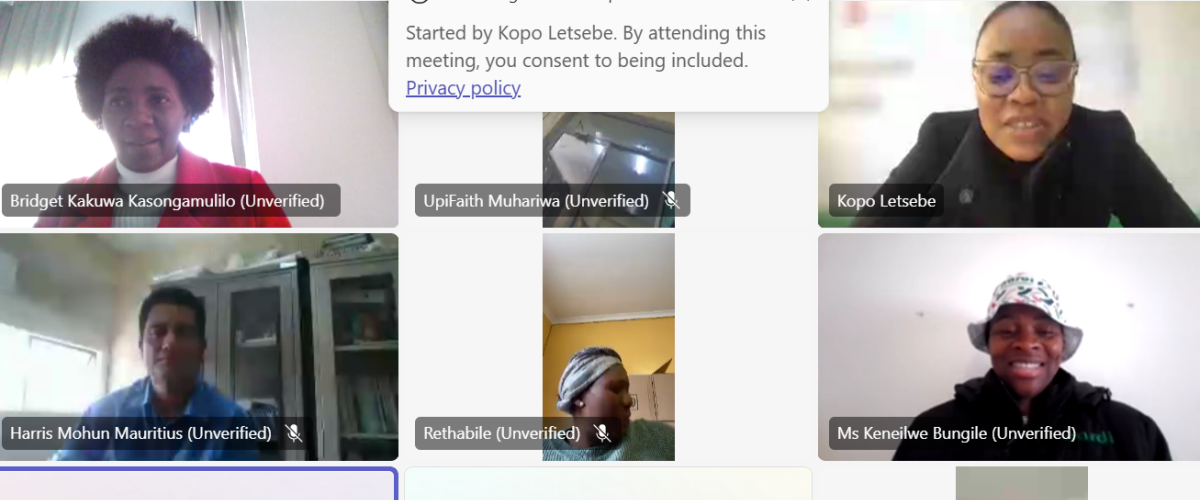
A wave of enthusiasm swept across Southern Africa this morning as the Centre for Coordination of Agricultural Research and Development for Southern Africa (CCARDESA) unveiled its newly revamped website and Knowledge Hub during a virtual training session attended by ICKM Focal Point Persons from nine SADC countries, Botswana, Mauritius, Eswatini, Lesotho, Malawi, Zimbabwe, South Africa, Zambia, and Mozambique logged on for the session, eager to explore the enhanced platform.
Opening the meeting with heartfelt thanks, Mrs. Bridget Kakuwa-Kasongamulilo, the Information, Communication & Knowledge Management officer at CCARDESA, paid tribute to the dedication of the focal point persons. “You are the lifeline of this Knowledge Hub. Your unwavering support in populating it with research outputs, news, and stories from your countries continues to make CCARDESA a trusted knowledge broker for the region,” she said.
The session was led by Ms. Maatla Nono Ditshupo , the ever-energetic Project Manager from MindQ, the team behind the revamp. Her demonstration of the website's fresh look and user-friendly features was both informative and energizing. She walked the team through how to log in, upload knowledge products, ranging from research papers to policy briefs and videos, and navigate thematic areas. She also introduced the multi-language interface, which supports English, French, and Portuguese, making the platform accessible across the linguistically diverse SADC region.
The revamped website also features three dynamic new databases designed to enhance regional collaboration and capacity building. The Expert Database connects users with agricultural professionals across the SADC region, while the Funding Opportunities Database keeps stakeholders updated on regional and international calls for proposals. Additionally, the Training Opportunities Database offers a central place for sharing short courses, scholarships, and learning events. These additions make the platform a comprehensive hub for accessing information, expertise, and growth opportunities.
“The design is so professional, and the website really shows the impact of CCARDESA,” exclaimed Mrs. Lorato Kgakatsi from Botswana. “And the branding is Tiptop!” she added enthusiastically.
Mrs. Keneilwe Bungile from NARDI Botswana was equally impressed. “This website is wonderful. I propose we link our national knowledge hubs to this regional hub so that we can share and learn from one another across countries,” she suggested, a proposal met with virtual nods and approvals.
From South Africa, Dr. Kwazi Zuma described the site as “well-designed” and saw it as a source of inspiration. “This gives ARC an opportunity to benchmark as we are also in the process of building our own knowledge hub,” he said.
For Mr. Bongani Mbubu from Eswatini, the revamped platform was more than just a facelift. “This is a big milestone for CCARDESA,” he declared. “But let’s make our national partners, like the Directorate of Research and Extension, more visible on the site.” The suggestion struck a chord with participants, sparking a quick consensus.
Mr. Harris Morris from Mauritius came in with a practical tip. “CCARDESA should create a short video that shows people how to use the site and Knowledge Hub. It will drive traffic and make access even easier,” he said. He also praised the multi-language option, noting, “It’s a real bonus that the site caters to all official SADC languages.”
Then came a heartwarming moment from Lesotho. Ms. Rethabile Nchee, one of the longest-serving ICKM Focal Persons, chimed in with fondness. “The training felt like a refresher course. I’m reminded of things I learned way back. The hub is very friendly I’m ready to upload more content!”
Mrs. Kasongamulilo also shared a major policy shift one that users had long been waiting for. “We have removed the questionnaire that was previously required to download documents,” she announced. “This aligns with our open access information policy. However, we still expect users to credit CCARDESA as the source. It’s not just policy it’s good research ethics.” The original owners of third party materials hosted on the hub have to be acknowledged accordingly. She further explained that materials are available for sharing under a “ShareAlike” license for non-commercial use, provided the source is properly attributed—ensuring both openness and academic integrity.
With gratitude, participants thanked Maatla for a seamless session and pledged to keep the content flowing. “We’re committed to ensuring this platform remains alive with fresh, relevant agricultural knowledge,” one Ms Upile Muhariwa from Malawi wrote in the chat.
Ms. Kopo Letsebe, CCARDESA’s ICT Officer, emphasized the importance of monitoring the platform’s performance through digital tools. “The new website allows us to track user engagement and downloads using Google Analytics,” he explained. “This data helps us understand what content is most valuable to users, which countries are most active, and where we need to improve. It’s a powerful tool for shaping future content and increasing visibility.”
This revamp made possible through the generous support of GIZ, CCARDESA’s long-standing partner in Knowledge Management since 2016, marks a new chapter in digital knowledge sharing for the region. This activity came through the Climate-resilient and Natural Resources Management Programme (C-NRM) which was funded by the German Federal Ministry of Economic Cooperation and Development (BMZ).
With new tools in hand, and fresh energy from across SADC, CCARDESA’s Knowledge Hub is poised to become even more vibrant—a true reflection of a region growing, innovating, and sharing together.






